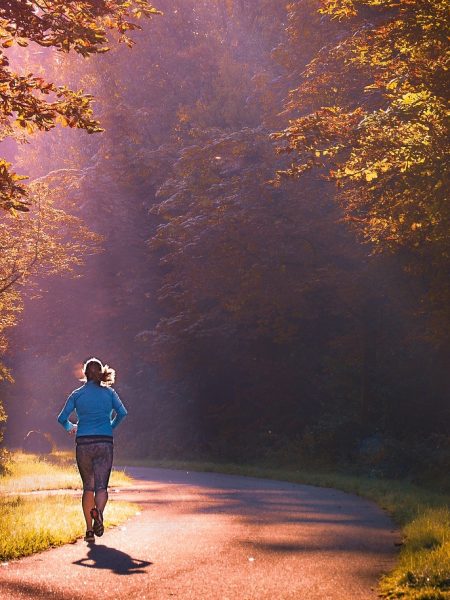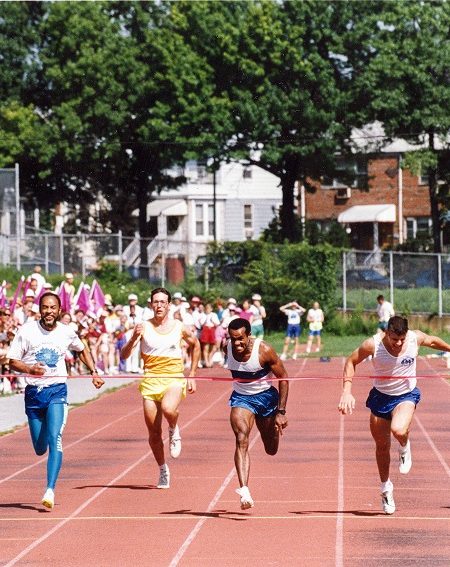By Toshala from The Blue Bird
Running. Done properly it is good for your health and spirituality. No matter how uncomfortable it is at the time, a good run that increases your heart rate and gives you a proper workout gets rid of negative energies and clears your mind, heart and emotions.
I know a lot of runners. That might seem obvious given that I am a member of the Sri Chinmoy Marathon Team which organises marathons, ultra-marathons, race series and the worldwide Sri Chinmoy Oneness-Home Peace Run, but what I mean is that just about all the people I know have, at some point or other, run. It’s affordable, doesn’t take a lot of equipment – a good pair of shoes will do – and people are natural at it.
When you’re in your heart and don’t let your thoughts get too much of a hold on you, you can run for miles, even if your fitness isn’t entirely what it could be. It is a case of mind over matter – I have witnessed leading athletes with finely sculpted bodies and well-developed physical stamina crumble and quit mid-race from a badly-tuned mind-set. Which is where self-transcendence comes in: this highly individualised concept means that people set their own criteria to compete against, and endurance events provide a handy arena for it.
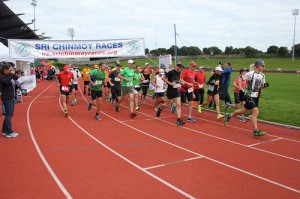
Since 1997 the Sri Chinmoy Marathon Team has been organising 24-hour races in New Zealand that are open to anyone who wishes to have a go. The 2014 race was held at Mt Smart track on the weekend of 27th and 28th September: thirty-five intrepid entrants hit the track at 9am on Saturday in a race that did not stop until 10am* the following day.
So what happens in a race like this? There are several categories: the 6-hour, the 12‑hour and the 24-hour races, as well as a teams’ event which starts at 9pm where teams run a relay for 12 hours (each team individually decides whether to change runner every hour, two hours, three hours or four. The shorter the turnaround times, the faster the team, in general.) You get to run on an officially measured, 400m special-surface track and you change direction every four hours so you don’t develop RSI or get seasick from continuously moving around in the same circle. You get officially counted and timed, cheered on and encouraged, a massage if you like, and there is a medical team in the form of St John Ambulance onsite the whole time. Food and drink are supplied – as much as you want – for 24 hours, and at the end of the race everyone gets a medallion, a certificate and a commemorative t-shirt.
The food the runners are nourished with is entirely vegetarian, as the whole worldwide Sri Chinmoy Marathon Team is totally vegetarian. The runners have a 24‑hour buffet table with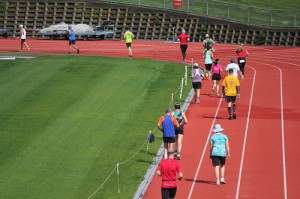 carbs for energy and good clean protein for endurance. A food tent with a small kitchen in it is set up trackside. The food is made right there and the buffet table is replenished continually. The runners graze the whole time, but at mealtimes the food magically disappears and the cooks galvanise into instant action.
carbs for energy and good clean protein for endurance. A food tent with a small kitchen in it is set up trackside. The food is made right there and the buffet table is replenished continually. The runners graze the whole time, but at mealtimes the food magically disappears and the cooks galvanise into instant action.
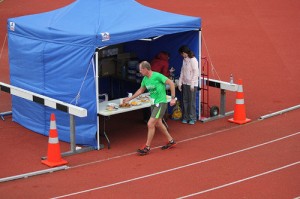 During the night when it gets cold, fats become popular and butter, olive oil or coconut oil are added to the food. Salt is also added in the form of Himalayan rock salt, soy sauce or liquid aminos. Miso soup with seaweed becomes extremely popular at night when the electrolytes need replenishing. Water, electrolyte drinks, cola and hot drinks are supplied for the entire race as well. (*For runners, everything has to be very well-blended and liquid, to the extent that it is easily pourable – and even the mashed potatoes, which also have liquid aminos added to them, are runny.)
During the night when it gets cold, fats become popular and butter, olive oil or coconut oil are added to the food. Salt is also added in the form of Himalayan rock salt, soy sauce or liquid aminos. Miso soup with seaweed becomes extremely popular at night when the electrolytes need replenishing. Water, electrolyte drinks, cola and hot drinks are supplied for the entire race as well. (*For runners, everything has to be very well-blended and liquid, to the extent that it is easily pourable – and even the mashed potatoes, which also have liquid aminos added to them, are runny.)The counters and other officials are another matter entirely – they require constant nourishment to stay focused and warm. It is amazing how much energy brain-power uses up, but for the counters, additionally, they are seated and appreciate fewer carbs (I mean, one doesn’t wish to be plumper than one is just at present – does one?) and more protein. They were plied with celery sticks filled with hummus, pizza (The Blue Bird supplied 10 pizzas for the occasion, ranging from vegan and gluten-free to vegetarian), samosas as well as soups, meals and mousetraps that were also served to the runners. Flagging counters were slipped chunks of chocolate, and coffee was on-tap; it was necessary to be on high alert the whole time as each runner came around after only 400 metres.
The records that are broken during these races prove that this food works as great fuel. In just this year’s race, Mick Thwaites from Brisbane broke the race record (which was 224km from 1997) by running 234km in 24 hours.
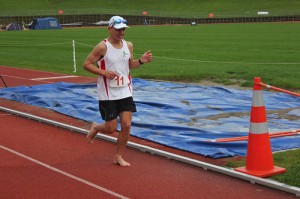 Wayne Botha (originally from South Africa but now residing in Auckland) holds the 24-hour barefoot record of 220km that he set in our race last year. He tried to break that record, but rain during the night softened the soles of his feet, reducing him to a walk, and he covered 203km instead (which, I have to say, is no mean feat!) Val Muskett from Hampden, Otago, ran a new women’s world record of nearly 111km for her age category (60-64 years old) in the 12-hour race, and the Sri Chinmoy Marathon Team’s own Niribili File set a national women’s record of 125km in her age category (65-69 years old) in the 24-hour race.
Wayne Botha (originally from South Africa but now residing in Auckland) holds the 24-hour barefoot record of 220km that he set in our race last year. He tried to break that record, but rain during the night softened the soles of his feet, reducing him to a walk, and he covered 203km instead (which, I have to say, is no mean feat!) Val Muskett from Hampden, Otago, ran a new women’s world record of nearly 111km for her age category (60-64 years old) in the 12-hour race, and the Sri Chinmoy Marathon Team’s own Niribili File set a national women’s record of 125km in her age category (65-69 years old) in the 24-hour race.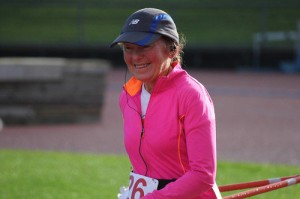
But the main objective of this event is self-transcendence. To come and set your own benchmark and then better it next time. This benchmark does not necessarily have to be a mileage but can be a personal goal, like, for instance, to endure and to be happy. This merely provides an opportunity to go out and really do it.
